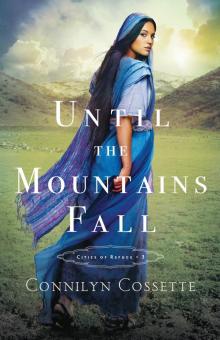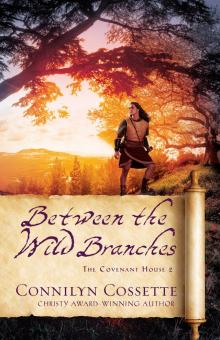- Home
- Connilyn Cossette
Between the Wild Branches Page 19
Between the Wild Branches Read online
Page 19
I’d hoped that the closing of the coffin would signal the end of this strange and unsettling night, but instead, a number of servants wound their way through the crowd, handing out crudely formed cups before others followed in their wake with jugs, pouring a generous measure of drink for each mourner.
The strong odor emanating from the cup pressed into my hand was distinctive and familiar. This was not simply a cup of wine to lift in tribute to the dead woman, but a drink tainted with a heavy amount of nutmeg and other herbs that would dull the senses and blur the sharp edges from our thoughts.
The king raised his own goblet, one that would contain twice as much of the noxious brew. “May the spirit of my lovely Orada be at rest in the bosom of the Great Mother,” he said. “And now that her murderer has been brought to justice, may she grant us the strength to pay back those who sent the woman here—the same detestable tribe from which the devil Samson originated.”
A murmur went up among the crowd as this new accusation took on shape.
“Yes,” he said, his voice growing stronger. “This treacherous Hebrew woman was of the same blood as he who murdered both my mother and my father, the great Darume, and we will return their villainy upon their heads tenfold.”
A number of shouts of agreement went up around me, encouraging Nicaro to continue his rant.
“And we will not stop once the Danites are annihilated,” he vowed. “We will deal with the rest of the Hebrews, who have killed far too many of our people and prevented us from claiming the land the gods led our forefathers to long ago.”
When he lifted the goblet to his lips and tipped back his head to drink deeply of the bitter substance, the rest of the assembly did as well. I, however, had no desire to lose my wits tonight, or any other night, so I feigned the motions before tipping my cup toward the ground and praying that the deepening shadows would hide my deception. With their cups drained, the mourners smashed the vessels on the stony ground, the sound of shattering pottery seeming to inflame them as they cheered our king and his call for vengeance, adding their own calls for the Hebrew scourge to be scrubbed from the land.
If only I could spin around, gather Shoshana in my arms, and flee, so she would not have to endure such vicious hatred for her people. But I could do nothing but remain still and hope that no one remembered that one of the bodies that stood among them flowed with the blood of those they pledged to destroy. In their fervor, they just might tear her apart. My fists clenched tight, preparing to come to her defense if so much as a whisper went up against her.
The strength of my own anger surprised me, and not only for her sake. The venom Nicaro spewed toward the people I had lived with for years, those I’d known to be mostly peace-loving, simple people only interested in tending to their farms, herding their livestock, and raising their families, was so contrary to my experience.
In fact, I could not help but remember how Elazar had spoken out against the way most of the Hebrews had cut peace treaties with the Canaanites and Philistines, how they traded extensively, intermarried, and even incorporated many of their worship practices into their own. And yet here was Nicaro threatening to not just dominate them or cause them to pay tribute, but to wipe them out. He was using this contrived murder of Orada to enflame his people’s hatred of the Hebrews—hatred that would be aimed at my sister, her husband, and their children. Unlike Zevi, who’d been hauled into Ashdod for the sake of being sold into horrors, Risi and I had been invited into Elazar and Yoela’s home and offered the respect, kindness, and hospitality for foreigners that was mandated by Torah law. And it was becoming increasingly apparent how woefully ungrateful I’d been for such goodness, along with how willfully blind I’d been to the true nature of my own people.
Now that the sun had completely slipped into the sea, torches held aloft by a number of priests and priestesses encircled us, the flicker of which only added to the sinister atmosphere of this morbid gathering in a place where hundreds, if not thousands, of Philistines were interred beneath our feet.
While the people around us continued to chatter with animation, their tongues loosened by the drink they’d imbibed, the priests and priestesses formed themselves in a long line, some still carrying torches and a few with hand drums or beribboned sistra. The drums began to pound a slow but sensual beat and those with sistra held them aloft, shaking the metallic instruments in a cadence reminiscent of a viper-tail warning. Then the single-file procession began to move, winding its way through the group, which parted to make room for the strange parade. Distinctly serpentine, the line slithered through the crowd, both men and women unashamedly bare-chested.
Since I’d pointedly avoided temple rituals in the years since I’d returned, I’d never seen this dance performed, but from the chants coming from the mouths of the participants, this display was both in honor of the underworld and the malevolent spirits that ruled it and a supplication for Orada’s soul to be received into their divine embrace.
As the chain of temple workers passed by me, I noticed that some of the women carried live serpents. A few looped the long and colorful creatures over their shoulders and others held venomous heads in careful grips, while the snakes wound around their arms in sinuous and threatening coils. Although many of the mourners shied away from the dangerous display, others reached out to stroke the deadly animals, too stupefied by the tainted wine to count the cost of such folly.
One of the famous rituals carried out by these same priestesses had been brought by our ancestors from our ancient homeland. After either allowing vipers to bite them or cutting their bodies so drawn venom could be dripped into the open wounds, the women would writhe on the ground like animals themselves and claim vivid and divine visions. After such fits, they often would be locked into frightful paralysis, sometimes for hours, until the effects of the venom wore off.
Thankfully, this unsettling dance ended before any such madness took place, but just as the day I’d foolishly followed my Gibeonite friends Adnan and Padi to one of their high places and witnessed the foul things practiced by the Canaanites, a deep sense of wrongness spread throughout my body. There was nothing good or beautiful in this. There was only malevolence and darkness that chilled me to the marrow of my bones, making me want to flee, the same way I’d done as a boy. No longer did I wish for my sister to be here with me now; she would be horrified by all of this.
Once the priests and priestesses had returned to their positions in a loose circle around the gathering, Nicaro lifted his palms over Orada’s coffin. “I make this vow to you, my beloved. Not only will I ensure that your blood is thoroughly avenged, but I will make certain that what should have been done centuries ago will no longer be neglected. The Hebrews will rue the day they left Pharaoh’s mud pits and mourn the moment they stepped foot in this land.”
Spittle gleamed at the corners of his lips as he ranted, and the black of his eyes nearly consumed the blue. He looked wholly unhinged, and I wondered how much of it was the drink and how much was madness leaking from the deepest parts of his soul. Those fathomless eyes then moved over the crowd and landed on me for a moment that seemed to stretch into eternity. Never was I so glad for the detached and haughty expression I’d cultivated for the fighting ring over the years, as I returned the king’s stare with a dispassionate one of my own. When he blinked and looked away, I could only hope that I’d been successful in concealing the maelstrom inside me, because the plans I’d been making with Jaru were far too important. The last thing I needed over the next couple of weeks was Nicaro’s scrutiny, or his suspicion.
“And not only will the Hebrew’s golden box soon be turned to splinters and ash,” the king declared, “but the name of their worthless God will be forgotten for all time.”
Twenty-One
Shoshana
Mariada had been quiet all day, not only during that terrible and sinister funeral but even earlier this afternoon, as I’d been helping her into the fitted bodice and multilayered green-and-blue skirt that see
med more suitable for a celebration than a mourning ritual. Assuming she was mourning Orada, I’d kept quiet, but by the time we’d returned from the burial grounds, where I’d discovered that poor Kina’s life had come to such a horrific end, my mistress appeared nearly as distressed as I felt.
She sat on the stool in front of me, pale-faced and vacant-eyed, while I unwound the braided bun that I’d fashioned atop her head only a few hours before. It was far past the time she normally retired, so she might only have been weary, but I sensed something else was amiss. Mariada was never this reticent, always chattering to me about anything and everything as I prepared her for bed each night.
“Are you feeling ill, my lady?” I asked as I began to remove the many shells and beads that I’d woven into the braids.
“I don’t feel the same way,” she said, shifting to look me in the eyes. “I hope you know that.”
“I’m not certain what you mean.”
“I don’t hate your people like my father does. Especially you.” She pressed her lips together, brow furrowed deeply. “I know he is still angry about what happened to my grandfather when that temple collapsed, but that was so long ago and the man who pulled it down died anyhow. And I certainly don’t understand why he would blame that maid for Orada’s death when everyone knows she and her maids were sick long before the Hebrew girl was called in to help.”
There was no way to easily explain to this sheltered and naïve girl about all the history that had passed between our people, and how the struggle for the Land had been going on for hundreds of years. Nor did I dare tell her that her father seemed to be afflicted with the same sort of baseless hatred that Pharaoh had—hatred that was rooted in something deep, ancient, and inexplicable to someone who knew nothing of Yahweh.
“Did you know her?” she asked, her tone compassionate.
“No,” I lied, for my daughter’s sake.
“All the same, I wish you’d not been there tonight. I had no idea what he had planned with the . . . altar.” She swallowed hard, and I knew she was remembering the sight of the blood spilling from that pot into the flames. I’d heard rumors of such terrible things in their blasphemous temples, but to see it with my own eyes, especially when the victim of such an atrocity was someone I knew . . . It was astounding that I’d even managed to stay upright. It was a miracle that I’d refrained from throwing myself at Lukio from behind and sobbing into his back. All I’d wanted in that moment had been the comfort of his presence. I’d spent the rest of the ceremony with my eyes firmly shut, praying that Yahweh would keep me on my feet and that I would be invisible to the enemies all around me who were practically crowing for my own blood with every one of the king’s pronouncements.
“I was worried that they all might turn on you right there,” she said, her voice warbling. “And I would not have been able to do a thing.”
How did such a tenderhearted girl come from the line of a tyrant like Nicaro of Ashdod?
“You must stay close to me, Shoshana. I don’t want you hurt.”
“Of course, my lady,” I said, glad for the task of unbraiding her hair to keep my shaking hands occupied.
“No more sneaking out at night.”
My startled gaze flew to meet hers in the large copper mirror atop her vanity table.
“You didn’t think I was truly ignorant of your midnight wanderings, did you?” A sly smile quirked her mouth as she shifted to look up at me.
“But . . . but how? You are always asleep soon after sunset.”
She bunched her lips to the side. “I may drift off early like my mother, but my sleep is as light as a cat. No matter how soft-footed you are, I usually wake either when you are coming or going.”
All my blood seemed to drain into my feet and, leaving half of her hair still in braids, I slumped onto the nearby couch so I did not crash to the floor.
“Don’t look so upset. I’ve never begrudged you a bit of freedom when your duties are complete. If I had, I would have said something before now. I trusted you to be discreet.”
I could not wrap my mind around the idea that all these months she’d known of my duplicity. But did that mean she also knew where I’d been? I could not ask without drawing attention to the true answer.
“But you must tell your lover that it is no longer safe. Not after what my father did to that young woman.” She winced at her own words.
Face blazing, I sputtered, “My . . . my lover?”
“He’s the one leaving shells for you, is he not?”
My mouth gaped open. I’d truly not given this young woman enough credit. She was far more observant that I’d ever guessed, and apparently I was far less stealthy than I’d believed myself to be. I could only hope that she would never know that it had been her own betrothed I’d met on a few of the nights I’d stolen from her room.
“Not a lover,” I said. “Only a friend. We . . .” I paused to clear my throat and give myself a moment to compose a believable story. “She and I are both Hebrews,” I said, thinking of my rare talks with Galit in the wine cellar. “We only speak of our homes and those we miss.”
Mariada frowned. “Are you truly so miserable here?”
“No. . . .” I hedged, not wanting to offend her. “You are the kindest of mistresses. I owe you so much. My life and that of my . . .” I let the words dwindle, uncertain of whether to say more.
“Of your baby,” she finished for me.
I nodded, my insides twisting into the usual knots I experienced whenever I thought of my child. Mariada and I had never discussed my daughter, except for the day I’d gone into labor and she’d had a midwife quietly escorted to her room, something no normal Philistine master would do for a slave.
“If I could have done so without repercussions, I would have let you keep her,” she said. “I hope you know that. But Tela was so adamant about having her. I worried they might send you away if I argued against it.” Her black brows furrowed above sorrowful blue eyes. “Amunet suggested as much, and she is not one to be trifled with.”
I was speechless at such revelations. I’d never guessed Mariada had been so determined to keep me with her.
“But why?” I asked, braving a question when she’d been so open with me. “Why do you care whether I stay here?”
She chewed on her lip for a moment. “The day you were brought here, I was in the courtyard,” she said. “I know you did not see me, but I’d been returning from the gardens with Jasara. I saw the soldiers bring you and the others in. I’d seen prisoners of war before, of course, when my father’s men brought in groups destined for the port or heavy labor, but I’d never seen them up close.”
My chest ached as I was thrown back to the humiliation of that day. I had been so focused on remaining upright and not shattering into a million pieces that I likely would not have noticed had the entire royal household been watching.
“But then I saw you, and the sight made me ill. I’d never thought of women being treated thus. And it was clear what had happened to you.” Her voice softened. “Your tunic was ripped and there was . . . blood on your legs.” She heaved out a shuddering sigh and shook her head mournfully. “I’d lived in this beautiful palace my entire life and never comprehended the cruelty of our soldiers. But unlike the other three women who were with you that day, you did not hang your head. You are so small, almost fragile-looking, but your back was straight, as if you were determined to meet whatever came next with dignity. And I couldn’t take my eyes off you. I don’t even really know why—it was almost like I was compelled by something deep in my bones to take action. I had this strange feeling that I wanted to be like you—so strong and bold, even after all you’d endured—and I knew that I needed you by my side.”
I almost laughed at the characterization of those moments in the courtyard. If only she’d known that my knees were knocking together as I stood in front of those awful men, one of whom had brutally violated me, trying not to lose what bile was left in my empty stomach after the long, bru
tal march from Beth Shemesh.
“I went straight to my father and asked for you to be my handmaid. I told him that Makila, the servant I had before, was not to my liking and I wanted her replaced.” She grinned. “And we all know that my father is partial to me since he adores my mother so much. It did not take much persuasion to have you sent to me.”
“I had no idea,” I said. I’d figured she’d truly needed a replacement for the woman whose position I’d filled.
“I’ve never regretted it. My sisters are far bolder than I, as you know, even with their husbands, and I could never be as forceful as Amunet, but having you near me has been a reminder that I should not be fearful of my own shadow.” She reached out to grip my hand. “And although you are my slave, you’ve also been a good friend to me. You always listen to me so patiently. I could not bear to see you hurt . . . or worse.” Tears formed in her crystalline eyes. “So, please, remain in this room at night.”
I nodded, still too stunned to form any sort of coherent thoughts.
“Good,” she said. “I hope that my father is far too distracted by the festival to remember your heritage. No matter what, I won’t let him take you from me, but it’s best not to take any chances, at least not until things settle down.”
“Of course, my lady,” I said, although I knew much better than to think the king would ever relinquish his vow of vengeance against my people. His rants had bordered on madness tonight.
“Will you call me Mariada when it just the two of us? I always search for my mother when you call me that.”
A smile twitched on my lips. She was truly such a sweet and kindhearted girl, and I nodded.
“Good,” she said, her answering smile making her appear every bit the radiant woman her mother was, and one who would be a fitting wife to the most handsome man in Ashdod.
I stood to resume unbraiding her hair—and to take my mind off the twinge of jealousy in my gut.

 Until the Mountains Fall
Until the Mountains Fall Between the Wild Branches
Between the Wild Branches To Dwell among Cedars
To Dwell among Cedars Counted With the Stars
Counted With the Stars Shelter of the Most High
Shelter of the Most High Shadow of the Storm
Shadow of the Storm A Light on the Hill
A Light on the Hill Wings of the Wind
Wings of the Wind